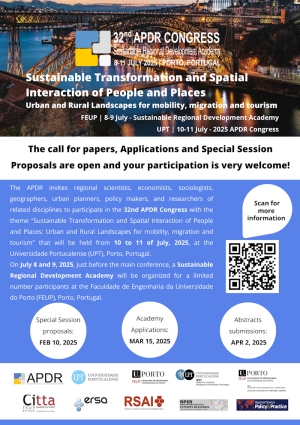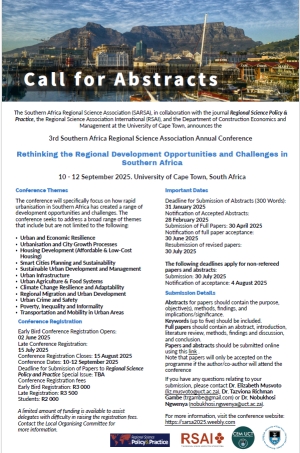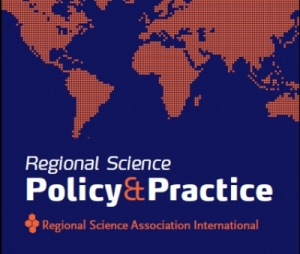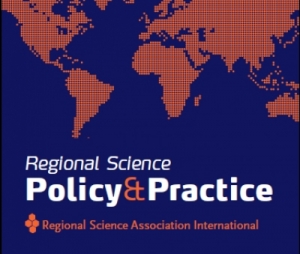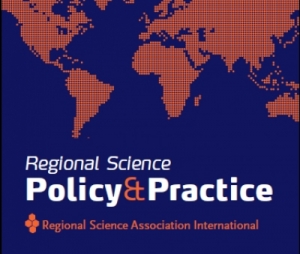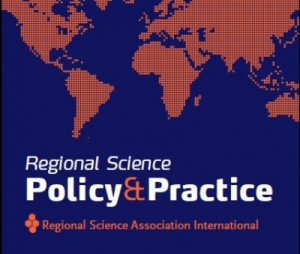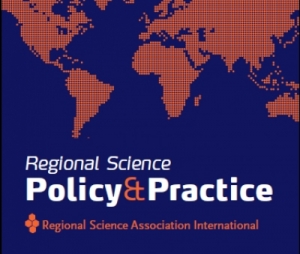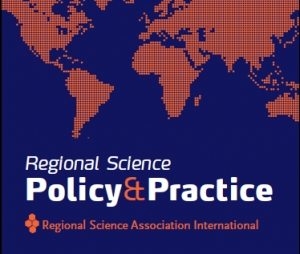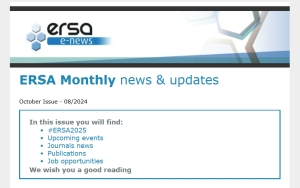Martin Beckmann RSAI Annual Award
Elisabete Martins
New Councillor at large elected
During the month of October, RSAI members voted for the election of new Councillor at large on the RSAI Council. The following candidate was eventually elected:
|
Prof. Sébastien Bourdin (EM Normandie Business School, France) |
Many congratulations to our new colleague! He will start their new term on Jan. 1, 2025.
At the same time, the Council warmly thanks the Councillor at large ending his term (Prof. Tomaz Dentinho (University of the Azores)) for his service.
Portuguese Section: Call for Papers | 32nd APDR Congress, July 8-11, 2025, Porto, Portugal
The APDR invites regional scientists, economists, sociologists, geographers, urban planners, policy makers, and researchers of related disciplines to participate in the 32nd APDR Congress with the theme "Sustainable Transformation and Spatial Interaction of People and Places: Urban and Rural Landscapes for mobility, migration and tourism" that will be held from 10 to 11 of July, 2025, at the Universidade Portucalense (UPT), Porto, Portugal.
On July 8 and 9, 2025, just before the main conference, a Sustainable Regional Development Academy will be organized for a limited number participants at the Faculdade de Engenharia da Universidade do Porto (FEUP), Porto, Portugal.
The call for papers and Special Session Proposals are open and your participation is very welcome!
Deadline for Special Session proposals: February 10, 2025. Proposals should be sent by email to the secretariat,of the Congress (This email address is being protected from spambots. You need JavaScript enabled to view it.).
Deadline for Abstracts submissions: April 2, 2025. Authors should submit their abstracts through online submission system by following the link https://cmt3.research.microsoft.com/APDR2025
Deadline for Academy Applications: March 15, 2025. More information at https://www.apdr.pt/congresso/2025/academy.html
All information at the congress website: http://www.apdr.pt/congresso/2025.
Looking forward to meeting you in Porto, Portugal!
The Organizing Committee and the Board of APDR
32nd APDR Congress

Call for papers | 3rd Southern Africa Regional Science Association Annual Conference, 10-12 September 2025, University of Cape Town, South Africa
The Southern Africa Regional Science Association (SARSA), in collaboration with the journal Regional Science Policy &The Southern Africa Regional Science Association (SARSA), in collaboration with the journal Regional Science Policy &Practice, the Regional Science Association International (RSAI), and the Department of Construction Economics andManagement at the University of Cape Town, announces the
3rd Southern Africa Regional Science Association Annual Conference
Rethinking the Regional Development Opportunities and Challenges in Southern Africa
10-12 September 2025, University of Cape Town, South Africa
Conference Themes
- Urban and Economic Resilience
- Urbanisation and City Growth Processes
- Housing Development (Affordable & Low-Cost Housing)
- Smart Cities Planning and Sustainability
- Sustainable Urban Development and Management
- Urban Infrastructure
- Urban Agriculture & Food Systems
- Climate Change Resilience and Adaptability
- Regional Migration and Urban Development
- Urban Crime and Safety
- Poverty, Inequality and Informality
- Transportation and Mobility in Urban Areas
Key dates
Notification of Accepted Abstracts: 28 February 2025
Submission of Full Papers: 30 April 2025
Notification of full paper acceptance: 30 June 2025
Resubmission of revised papers: 30 July 2025
The following deadlines apply for non-refereed papers and abstracts:
Submission: 30 July 2025
Notification of acceptance: 4 August 2025
More info at: https://sarsa2025.weebly.com/
Call for Papers | RSPP Special Issue: Regional disparities, social welfare and economic development

Regional Science Policy & Practice (RSPP)
Call for Papers Special Issue: Regional disparities, social welfare and economic development
Editors
Carolina Guevara Rosero, Departamento de Economía Cuantitativa, Facultad de Ciencias, Escuela Politécnica Nacional - This email address is being protected from spambots. You need JavaScript enabled to view it.
This calls for public policy recommendations and actions aiming to reduce unequal regional development and growth.
This special call aims to mobilize studies on regional disparities that give insights for possible policy recommendations. We kindly invite contributions on topics related (but not limited) to:
• Spatial disparities at the subnational level, causes and effects
• Firms (innovation) and social networks in regions
• Effects of spatial disparities in economic performance
• Effects of spatial disparities in welfare
• Regional migration
• Regional economic structure and productive networks and resilience
Manuscript submission information:
All submissions must be original and may not be under review elsewhere. All manuscripts will be submitted via the Regional Science Policy & Practice online submission system (https://www.editorialmanager.com/rspp/). Authors should indicate in the cover letter that the paper is submitted for consideration for publication in this special issue “Regional disparities, social welfare and economic development”, otherwise, your submission will be handled as a regular manuscript.
- Submissions open until October 15, 2025
Call for Papers | RSPP Special Issue on Sustainability and regional challenges of GVC-dependent FDI development path
RSPP Call for Papers
Special Issue on Sustainability and regional challenges of GVC-dependent FDI development path
Editors
Magdolna Sass - Institute of World Economics, Hungary; This email address is being protected from spambots. You need JavaScript enabled to view it.
Zoltán Gál - University of Pécs, Hungary; This email address is being protected from spambots. You need JavaScript enabled to view it.
This special issue delves into the sustainability of Global Value Chain (GVC) dependent Foreign Direct Investment (FDI) development in dependent market economies (DME) of Central and Eastern Europe (CEE) and Latin America (Mexican case). It examines the regional impacts and transformative effects of GVC-dependent FDI, particularly in the lower value-added segments of production and assembly. The issue will compare the growth experiences of DME economies, address the challenges posed by recent economic disruptions, and explore the readiness of these regions for Industry 4.0. By proposing alternative models and strategies, this issue aims to foster a sustainable and resilient economic future for CEE and Mexican regions within the global economic landscape.
Keywords
- Sustainability
- Global Value Chains (GVCs)
- Foreign Direct Investment (FDI)
- Central and Eastern Europe (CEE)
- Regional Development
- Industry 4.0
Manuscript submission information:
All submissions must be original and may not be under review elsewhere. All manuscripts will be submitted via the Regional Science Policy & Practice online submission system (https://www.editorialmanager.com/rspp/). Authors should indicate in the cover letter that the paper is submitted for consideration for publication in this special issue “Sustainability and regional challenges of GVC-dependent FDI development path”, otherwise, your submission will be handled as a regular manuscript.
- Submissions open until March 31, 2025
Call for Papers | RSPP Special Issue on Sustainability in the Middle East
RSPP Call for Papers
Special Issue on Sustainability in the Middle East
Editors
Umut Türk - Abdullah Gül University, Kayseri, Türkiye; This email address is being protected from spambots. You need JavaScript enabled to view it.
Armağan Teke Lloyd - Abdullah Gül University, Kayseri, Türkiye; This email address is being protected from spambots. You need JavaScript enabled to view it.
Current circumstances highlight the pressing need for immediate action, particularly in the domain of SDG 16—Peace, Justice, and Strong Institutions for the Middle East. Interconnected socioeconomic factors necessitate prompt attention to goals 10 (Reduced Inequality), 5 (Gender Equality), and 8 (Decent Work and Economic Growth). The Middle East grapples with distinct challenges, including political instability, water scarcity, and socio-economic disparities. Issues of inequality, unemployment, and social exclusion are prevalent in many Middle Eastern countries. Migration flows in the region have been significant, driven by factors such as economic opportunities, political instability, conflict, and social reasons. In addressing these multifaceted challenges, the SDGs offer a relevant framework, emphasizing critical goals such as peace, quality education, decent work, and reduced inequality. This special issue aims to address emerging research challenges and novel approaches/findings in this field.
Keywords
Sustainable Development, Middle East, Peace, Environment
Manuscript submission information:
All submissions must be original and may not be under review elsewhere. All manuscripts will be submitted via the Regional Science Policy & Practice online submission system (https://www.editorialmanager.com/rspp/). Authors should indicate in the cover letter that the paper is submitted for consideration for publication in this special issue “Sustainability in the Middle East”, otherwise, your submission will be handled as a regular manuscript.
- Submissions open until October 15, 2025.
Call for Papers | RSPP Special Issue on A New Toolbox for Novel Research in Regional, Urban and Spatial Studies
RSPP Call for Papers
Special Issue on A New Toolbox for Novel Research in Regional, Urban and Spatial Studies
Editor
Katarzyna Kopczewska - University of Warsaw, Faculty of Economic Science, Poland. Email: This email address is being protected from spambots. You need JavaScript enabled to view it.
Novelty in research is rooted in critical observation, theory, data or methods. There is no progress in science without these elements. Very often the focus is on the first two, while the last two are neglected. The aim of this special session is to collect papers whose strength lies in data and/or methods. They should open up new avenues for regional research, allowing new questions to be asked and the same phenomena to be seen with new eyes. Taking a new approach is risky - it may not always be successful and convincing to others. But it can also bring great scientific gain and stimulate scientific debate, which is the seed of conferences and publications. This session aims to stimulate discussion on novel methods and data that can be used in regional, urban and spatial studies.
Welcome topics include, among others:
- spatial machine learning
- links between spatial statistics, spatial econometrics and spatial machine learning
- novel approaches to dealing with low granularity spatial data
- methods, tricks and approaches for dealing with spatio-temporal data
- new algorithms for dealing with big data and streaming data
- challenges of aggregating spatial data of different granulation - coherent databases of pixel, raster, line, regional, point, polygon data
- new sources of data that can be used in regional, urban and spatial studies.
- what is right - theory-driven, problem-driven or data-driven science?
Manuscript submission information:
All submissions must be original and may not be under review elsewhere. All manuscripts will be submitted via the Regional Science Policy & Practice online submission system (https://www.editorialmanager.com/rspp/). Authors should indicate in the cover letter that the paper is submitted for consideration for publication in this special issue “A New Toolbox for Novel Research in Regional, Urban and Spatial Studies”, otherwise, your submission will be handled as a regular manuscript.
- Submissions open until January 15, 2025.
Call for Papers | RSPP Special Issue on Regional Sustainable Development in the Global South
RSPP Call for Papers
Special Issue on Regional Sustainable Development in the Global South
Editors
Abdul Shaban, Tata Institute of Social Sciences, Mumbai, This email address is being protected from spambots. You need JavaScript enabled to view it.
The Global South is undergoing an urban revolution with profound consequences to its society, economy, culture, polity, demography, human behaviour, and built and natural environments. Many associates this urbanism to arrhythmic (Lefebvre, 2004; Shaban and Datta, 2019) development of Global South through ‘fast urbanization’ (Datta and Shaban, 2017) based on ‘fast policies’ (Peck and Theodore, 2015) from Global North, while others locate the changes in the paradigm of new economic development and social liberation (Brugmann, 2009). Some studies have located the urbanization in the Global South within the essence of northern urbanity or ‘planetary’ urbanism (Brenner and Schmid, 2015), while others have differentiated its character and called it ‘Southern Urbanism’ (Schindler, 2017). ‘Fast’ urbanization and city building is seen as utopia by the post-colonial states of the Global South to overcome their economic underdevelopment. The amassed investments in cities by both the private sector and the entrepreneurial states are sharpening the rural-urban divides in development with massive consequences to both the poverty and aspiration led migration to urban centres, especially to the mega cities. Theme based urbanism and city building from garden city, ecocity, intelligent city to smart city has emerged as a trope for urban future and sustainability.
This urban moment in the Global South is caught in many contradictory processes: slow societies with fast urbanism; burgeoning urban system with imbalanced hierarchies of cities; increased city building and rising houselessness and inadequate social and physical infrastructure; rising means of transport with increased traffic congestions; economic growth with increased inequalities; increased accumulation of wealth in urban centres with increased dispossession of the rural; increased nationalism with increased exoticism; increased emphasis on democracy with decreased citizens’ participation; increased size of government with declining social welfare; increased planning with rising informality; rising economic development with increased adverse environmental consequences; rising middle class with sharpening ethnic divides; increased policing with rising crimes, etc.
In the above context, we invite well-researched papers and case studies from the Global South (Latin America, Africa, Asia, and Oceania) around the following sub-themes (with discussion on implications to the urban future),
- Urban planning and local context
- Urban infrastructure (including digital Infrastructure)
- Urban mobilities
- Urbanization and democratic participation
- Socio-spatial segregation and exclusion in cities
- Urban violence and community resilience
- Urban environment and climate action
- Engagement with sustainable urbanization
Manuscript submission information:
All submissions must be original and may not be under review elsewhere. All manuscripts will be submitted via the Regional Science Policy & Practice online submission system (https://www.editorialmanager.com/rspp/). Authors should indicate in the cover letter that the paper is submitted for consideration for publication in this special issue “Regional Sustainable Development in the Global South”, otherwise, your submission will be handled as a regular manuscript.
- Submissions open until December 31, 2024.
References
Brenner N and Schmid C (2015) Towards a New Epistemology of the Urban? City 19 (2-3): 151–182.
Brugmann J (2009). Welcome To Urban Revolution: How Cities Are Changing The World. New Delhi: HarperCollins.
Datta A and Shaban A (eds) (2016) MegaUrbanization in the Global South: Fast Cities and New Urban Utopias of the Postcolonial State. New York: Routledge.
Lefebvre H (2004) Rhythmanalysis: Space, Time and Everyday Life (Translated by Stuart Elden and Gerald Moore). Paris: Continuum.
Peck J and Theodore N (2015) Fast Policy: Experimental Statecraft at the Thresholds of Neoliberalism. Minneapolis: University of Minnesota Press.
Schindler S (2017) Towards a paradigm of Southern urbanism. City 21(1): 47-64.
Shaban A and Datta A (2019) Towards 'Slow' and 'Moderated' Urbanism. Economic and Political Weekly 54(48):36-42.
Call for Paper | RSPP Special Issue on Post-Covid Latin American Economies: countries, regions and cities

Regional Science Policy & Practice (RSPP)
Call for Papers Special Issue: “Post-Covid Latin American Economies: countries, regions and cities”.
Editor
Carlos Azzoni - Department of Economics, University of Sao Paulo, Brazil; This email address is being protected from spambots. You need JavaScript enabled to view it.
Following the containment of the COVID-19 pandemic, Latin American countries focused on fostering recovery processes, which have been heterogeneous across the region. The pandemic not only had negative effects but also compelled many companies and workers to promote remote working, accelerating a process that would likely have taken many years to reach the levels observed during the health crisis. Moreover, the skills developed during this period continue to be utilized by companies and workers. It is probable that many tasks now carried out from home and meetings that previously required travel are now conducted online. Likewise, delivery firms that experienced a significant increase in their activities during the pandemic continue to experience high levels of demand.
This special issue focuses on the changes that have emerged, especially at the subnational level, and how they have influenced the economic recovery processes.
Regardless of the topic chosen, the papers should have a short introductory section describing the overall impact of the pandemic on the countries' economy as a whole and on their regions and/or cities, depending on the geographical scale chosen, and the path of recovery up to recent times.
The papers may concentrate on specific topics, such as labor market modifications, poverty, income inequality, social interactions, political preferences, or other issues chosen by the researchers.
Keywords
COVID-19 economic impacts; Recovery post COVID-19; Socioeconomic changes; Regional inequality; Urban changes
Manuscript submission information:
All submissions must be original and may not be under review elsewhere. All manuscripts will be submitted via the Regional Science Policy & Practice online submission system (https://www.editorialmanager.com/rspp/). Authors should indicate in the cover letter that the paper is submitted for consideration for publication in this special issue “Post-Covid Latin American Economies: countries, regions and cities”, otherwise, your submission will be handled as a regular manuscript.
- Submissions open until December 31, 2024.
ERSA Monthly E-news - October2024
|
About Us
The Regional Science Association International (RSAI), founded in 1954, is an international community of scholars interested in the regional impacts of national or global processes of economic and social change.



